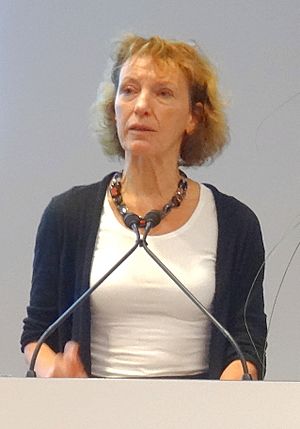Maria Leptin facts for kids
Quick facts for kids
Maria Leptin
|
|
|---|---|

Leptin in Heidelberg, 2017
|
|
| President of the European Research Council | |
| Assumed office 1 November 2021 |
|
| Preceded by | Jean-Pierre Bourguignon (interim) |
| Director of the European Molecular Biology Organization | |
| In office 1 January 2010 – 30 October 2021 |
|
| Preceded by | Hermann Bujard |
| Succeeded by | Fiona Watt |
| Personal details | |
| Born | 15 September 1954 Hamburg, Germany |
| Spouse | Jonathan Howard |
| Children | 2 |
| Alma mater | Basel Institute for Immunology Heidelberg University University of Bonn |
| Scientific career | |
| Fields | Developmental biology Immunology |
| Institutions | European Molecular Biology Organization European Molecular Biology Laboratory University of Cologne Max Planck Institute for Developmental Biology MRC Laboratory of Molecular Biology |
| Doctoral advisor | Fritz Melchers |
Maria Leptin (born September 15, 1954) is a German scientist. She studies how living things develop (developmental biology) and how their bodies fight off sickness (immunology). She is currently the president of the European Research Council. Before that, she was the director of the European Molecular Biology Organization from 2010 to 2021.
Contents
Maria Leptin's Early Life and Studies
Maria Leptin studied mathematics and biology at the University of Bonn and Heidelberg University. She first thought about becoming a teacher. However, in 1979, she decided to pursue a PhD at the Basel Institute for Immunology. This decision came after a practical class taught by researchers there.
Her PhD Research
For her PhD, Maria Leptin worked with Fritz Melchers. She focused on how B-cells become active and change into plasma cells. These cells are important parts of the body's immune response to infections. She finished her PhD in 1983.
Maria Leptin's Scientific Career
After earning her PhD in 1984, Maria Leptin joined Michael Wilcox's team. This was at the MRC Laboratory of Molecular Biology (LMB) in Cambridge. Here, she worked as a postdoctoral fellow.
Studying Development in Fruit Flies
At LMB, Maria Leptin became very interested in developmental biology. She studied how special proteins called integrins help in the early growth of Drosophila (fruit flies). In 1988, she became a staff scientist at LMB.
Research on Cell Movement
Her time at LMB sparked her interest in how cells move and change shape. She also studied gastrulation, which is a key step in early embryonic development. She began researching gastrulation in 1989. This was during a short visit to Patrick O'Farrell's group at the University of California, San Francisco.
Leading Research Groups
After her visit, she moved to the Max Planck Institute for Developmental Biology in Tübingen, Germany. There, she led a research group focusing on gastrulation until 1994. That year, she became a professor at the University of Cologne, Institute of Genetics. She still holds this position today.
Her research group in Cologne first continued studying gastrulation. Later, they shifted to looking at how the Drosophila respiratory system develops. Eventually, Maria Leptin started using zebrafish as a model organism. She used them to study the body's first line of defense, called the innate immune response.
Visiting Professor Roles
Maria Leptin also had two more experiences as a visiting professor. The first was in 2001 at the École Normale Supérieure in Paris. The second was as a visiting scientist at the Wellcome Sanger Institute in the UK between 2004 and 2005.
Leadership at EMBO and ERC
In 2009, Maria Leptin was chosen to be the director of the European Molecular Biology Organization. She started this role in January 2010. She also set up a research group at the European Molecular Biology Laboratory in Heidelberg. This group studies what makes cells take certain shapes in Drosophila. They also use live imaging to watch the innate immune response in zebrafish.
In 2018, Maria Leptin was a visiting professor of Cell and Developmental Biology at the University of Oxford. In June 2021, she was appointed as the next president of the European Research Council. She officially started this important role on November 1, 2021.
Awards and Recognitions
Maria Leptin has received many honors for her important work in science:
- She became a member of the European Molecular Biology Organisation in 1996.
- In 1998, she joined Academia Europaea.
- She became a corresponding member of the North Rhine-Westphalian Academy of Sciences, Humanities and the Arts in 2010.
- In 2016, she became a member of the German National Academy of Sciences Leopoldina.
- She was made an Honorary Fellow of the Academy of Medical Sciences in 2017.
- In 2022, she became a Foreign Member of the Royal Society.
 | Dorothy Vaughan |
 | Charles Henry Turner |
 | Hildrus Poindexter |
 | Henry Cecil McBay |

